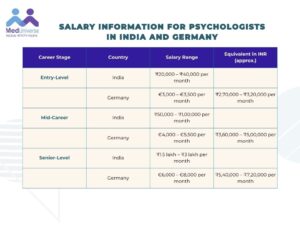When it comes to careers in healthcare, Physiotherapist and nurses play a crucial role in ensuring mental and physical well-being. However, salaries and working conditions for these professions can vary significantly between countries. In this article, we’ll compare Indian vs German Healthcare Jobs for Physiotherapist & Nurses, analyzing salary differences, job demand, work culture, and career growth opportunities.
Healthcare Industry in India vs Germany
Growth of the Healthcare Sector
The healthcare sector in both India and Germany is expanding, but they operate on different models. India’s healthcare industry is driven by private hospitals, government-funded institutions, and emerging telehealth services. Germany, on the other hand, has a highly structured, universal healthcare system, ensuring access to quality medical care for all citizens.
Demand for Physiotherapist and Nurses
- India: The demand for mental health professionals is growing due to increased awareness of mental health issues. However, the ratio of Physiotherapist per capita remains low. The need for qualified nurses is also high, but salaries are often lower due to an oversupply of candidates.
- Germany: With an aging population and increasing mental health concerns, the demand for Physiotherapist and nurses is high. Germany actively recruits foreign-trained healthcare professionals, including those from India.
Salaries for Physiotherapist in India vs Germany

Entry-Level Salaries
- India: A freshly graduated psychologist in India can expect to earn between ₹20,000 – ₹40,000 per month depending on the workplace (hospitals, clinics, private practice).
- Germany: In contrast, entry-level Physiotherapist in Germany earn around €3,000 – €3,500 per month (₹2,70,000 – ₹3,20,000), significantly higher than in India.
Mid-Career Earnings
- India: After 5-10 years of experience, a psychologist’s salary can increase to ₹50,000 – ₹1,00,000 per month, especially in corporate settings and private practices.
- Germany: A psychologist with 5+ years of experience in Germany can earn around €4,000 – €5,500 per month (₹3,60,000 – ₹5,00,000).
Senior-Level Compensation
- India: Highly experienced Physiotherapist, especially those running their own practices, can earn ₹1.5 lakh – ₹3 lakh per month.
- Germany: Senior Physiotherapist can make anywhere between €6,000 – €8,000 per month (₹5,40,000 – ₹7,20,000), particularly in specialized fields like neuropsychology or clinical research.
Specialized Nursing Salaries
In both countries, nurses specializing in ICU, surgical, or neonatal care earn higher wages. In Germany, specialized nurses can make €5,500+ per month (₹5,00,000+), while in India, they may earn up to ₹1.5 lakh per month in top hospitals.
Cost of Living and Salary Adjustments
Although German salaries are much higher, the cost of living is also greater. Rent, healthcare insurance, and taxation take up a significant portion of income. In contrast, India has a lower cost of living, but inflation affects real income.
Work Environment & Job Satisfaction
- India: Nurses and Physiotherapist often experience long working hours, understaffed hospitals, and salary delays in some institutions.
- Germany: Better working conditions, regulated hours, and a balanced work-life ratio make Germany a more attractive option for healthcare professionals.
Job Security & Career Growth
Germany offers long-term job security and defined career growth paths for healthcare professionals, whereas India still struggles with job saturation in urban areas.
Work-Life Balance: India vs Germany
German workers enjoy better work-life balance due to strict labor laws, while Indian healthcare professionals often work beyond standard hours due to workforce shortages.
Required Qualifications & Licensing
For Physiotherapist:
- In India, a Master’s in Psychology is required, but clinical physiotherapist must obtain an RCI license.
- In Germany, a psychologist must complete state-recognized training (Approbation) and meet language proficiency requirements.
For Nurses:
- In India, a BSc in Nursing or a Diploma in Nursing is sufficient.
- In Germany, foreign nurses must pass the Anerkennung process (qualification recognition) and prove B2-level German proficiency.
Opportunities for Indian Professionals in Germany
Germany actively recruits Indian nurses and physiotherapist due to workforce shortages. Programs like Meduniverse help Indian nurses secure jobs in German hospitals.
Challenges for Indian Physiotherapist & Nurses in Germany
- Language barriers
- Licensing difficulties
- Cultural differences in patient care
Benefits of Working in Germany’s Healthcare System
- Higher salaries and structured career growth
- Work-life balance
- Access to advanced medical technology
Comparing Taxation and Deductions
German salaries include high tax deductions (20-40%), whereas Indian taxation for healthcare professionals is relatively lower. However, German professionals enjoy better social security benefits.
Future Outlook for Healthcare Jobs in India & Germany
India’s healthcare industry is growing, but salaries remain lower. Germany is expected to continue hiring foreign-trained healthcare workers, making it an attractive option for Indian professionals.
Conclusion & Final Thoughts
When comparing Indian vs German Healthcare Jobs for Physiotherapist & Nurses, Germany offers higher salaries, better working conditions, and career stability. However, challenges like language barriers and licensing requirements must be considered before making the move.
FAQs
1. Are Indian psychology degrees valid in Germany?
No, additional training and licensing are required.
2. Can Indian nurses work in Germany without learning German?
No, B2-level German proficiency is mandatory.
3. What is the demand for Physiotherapist in Germany?
High, especially in clinical psychology and mental health counseling.
4. Do nurses in Germany get free healthcare?
Yes, they receive comprehensive health insurance benefits.
5. Is it worth moving to Germany as a Physiotherapist?
Yes, if you meet licensing requirements and are willing to adapt to the system.
